परिचय
निर्माण उद्योग में, आधुनिक वास्तुकला की लगातार बढ़ती मांगों को पूरा करने के लिए सटीकता और दक्षता सर्वोपरि हैं। निर्माण का एक महत्वपूर्ण पहलू विभाजनों और फ्रेमिंग के लिए उच्च गुणवत्ता वाले ड्राईवॉल स्टड्स बनाना है। ड्राईवॉल स्टड्स के पारंपरिक विनिर्माण तरीके श्रम-गहन और समय लेने वाले हो सकते हैं। हालांकि, उन्नत प्रौद्योगिकी के आगमन के साथ, एक गेम-चेंजर उभरा है: ड्राईवॉल स्टड रोल फॉर्मिंग मशीन.
ड्राईवॉल स्टड रोल फॉर्मिंग मशीन क्या है?
ड्राईवॉल स्टड रोल फॉर्मिंग मशीन ड्राईवॉल निर्माण में उपयोग होने वाले धातु स्टड्स को बनाने के लिए विशेष उपकरण है। यह रोल फॉर्मिंग सिद्धांत पर कार्य करती है, जिसमें धातु की सतत पट्टी कई स्टेशनों से होकर गुजरती है जो स्टड के वांछित प्रोफाइल को धीरे-धीरे बनाती है। परिणामस्वरूप एक सटीक आकार का और सुसंगत धातु स्टड प्राप्त होता है, जो विभिन्न निर्माण अनुप्रयोगों के लिए तैयार होता है।
ड्राईवॉल स्टड रोल फॉर्मिंग मशीन कैसे कार्य करती है?
ड्राईवॉल स्टड रोल फॉर्मिंग मशीन का कार्य सिद्धांत चतुर और सरल है। प्रक्रिया सामान्यतः स्टील की धातु शीट के कॉइल से शुरू होती है जो मशीन में डाली जाती है। शीट एक श्रृंखला के रोलर डाइज से होकर गुजरती है, प्रत्येक स्टड प्रोफाइल के विशिष्ट भाग को आकार देने के लिए डिज़ाइन की गई है। धीरे-धीरे, धातु पट्टी स्टेशनों से होकर गुजरते हुए स्टड का आकार ले लेती है। अंतिम उत्पाद को आवश्यक लंबाई में काटा जाता है और पैकेजिंग या आगे प्रसंस्करण के लिए एकत्र किया जाता है।
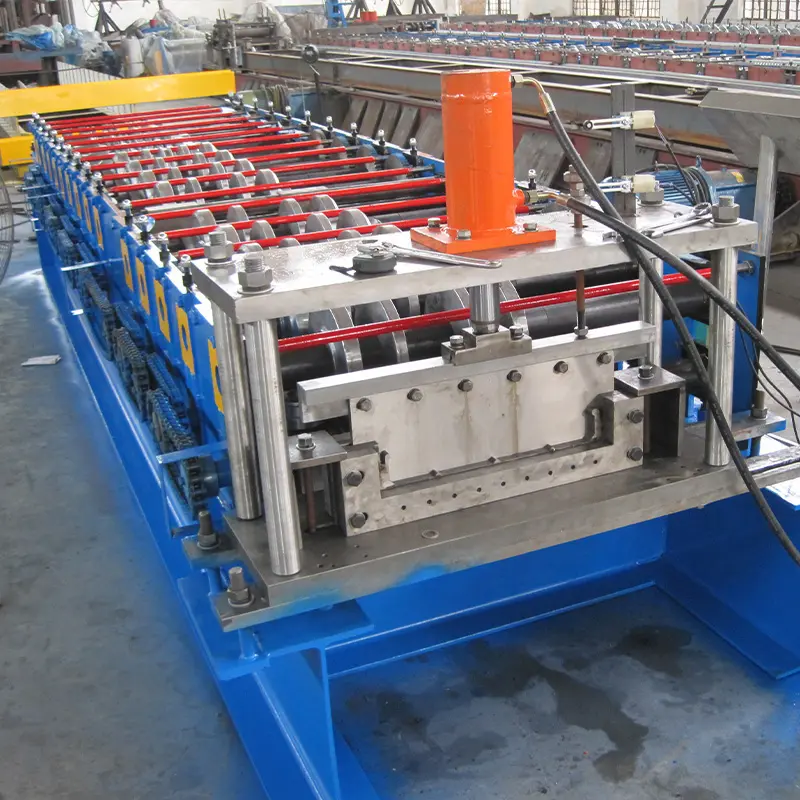
ड्राईवॉल स्टड रोल फॉर्मिंग मशीन उपयोग करने के लाभ
ड्राईवॉल स्टड रोल फॉर्मिंग मशीन के अपनाने से पारंपरिक विनिर्माण विधियों पर कई लाभ प्राप्त होते हैं:
- उन्नत दक्षतामशीन की स्वचालित प्रक्रिया उत्पादन गति को काफी बढ़ाती है, प्रत्येक स्टड को बनाने में लगने वाले समय को कम करती है।
- : Collect/output.: With precise control over the forming process, each stud achieves uniformity in shape and dimensions, guaranteeing superior quality.
- Cost Savings: Higher production rates and reduced labor needs result in long-term cost savings.
- Versatility: ड्राईवॉल स्टड रोल फॉर्मिंग मशीनें विभिन्न स्टड प्रोफाइल बना सकती हैं, जो विभिन्न निर्माण आवश्यकताओं को पूरा करती हैं।
- अपशिष्ट न्यूनीकरण: यह प्रक्रिया न्यूनतम अपशिष्ट उत्पन्न करती है, सामग्री के उपयोग को अनुकूलित करती है और पर्यावरणीय प्रभाव को कम करती है।
ड्राईवॉल स्टड रोल फॉर्मिंग मशीनों के प्रकार
विभिन्न प्रकार की ड्राईवॉल स्टड रोल फॉर्मिंग मशीनें उपलब्ध हैं, प्रत्येक विशिष्ट उत्पादन आवश्यकताओं के अनुरूप डिज़ाइन की गई है:
सिंगल प्रोफाइल ड्राईवॉल स्टड रोल फॉर्मिंग मशीन
सिंगल प्रोफाइल रोल फॉर्मिंग मशीन उन व्यवसायों के लिए आदर्श है जो किसी विशेष स्टड प्रोफाइल पर केंद्रित हैं। यह एक ही स्टड प्रकार की बड़ी मात्रा में उत्पादन के लिए सरलता और दक्षता प्रदान करती है।
मल्टीपल प्रोफाइल ड्राईवॉल स्टड रोल फॉर्मिंग मशीन
विभिन्न स्टड प्रोफाइलों से निपटने वाले निर्माताओं के लिए, मल्टीपल प्रोफाइल रोल फॉर्मिंग मशीन सर्वोत्तम विकल्प है। यह उत्पादन गति से समझौता किए बिना बहुमुखी प्रतिभा प्रदान करती है।
फुली ऑटोमेटिक ड्राईवॉल स्टड रोल फॉर्मिंग मशीन
फुली ऑटोमेटिक मशीनें न्यूनतम मानवीय हस्तक्षेप की आवश्यकता रखती हैं, क्योंकि वे लोडिंग, फॉर्मिंग, कटिंग और स्टैकिंग को स्वचालित रूप से कर सकती हैं।
सेमी-ऑटोमेटिक ड्राईवॉल स्टड रोल फॉर्मिंग मशीन
सेमी-ऑटोमेटिक मशीनें अधिक बजट-अनुकूल हैं और सामग्री की मैनुअल लोडिंग तथा अनलोडिंग शामिल करती हैं, जबकि मशीन फॉर्मिंग प्रक्रिया को संभालती है।
ड्राईवॉल स्टड रोल फॉर्मिंग मशीन चुनते समय विचार करने योग्य कारक
अपने व्यवसाय के लिए सही मशीन का चयन महत्वपूर्ण है। निर्णय लेने से पहले निम्नलिखित कारकों पर विचार करें:
उत्पादन क्षमता
अपने उत्पादन आवश्यकताओं का मूल्यांकन करें और ऐसी मशीन चुनें जो आपकी उत्पादन क्षमता को पूरा कर सके या उससे अधिक हो।
सामग्री संगतता
सुनिश्चित करें कि मशीन आपके उपयोग की योजना वाले धातु शीटों के प्रकारों और मोटाई को संभाल सके।
定制选项
कुछ मशीनें अनुकूलन सुविधाएँ प्रदान करती हैं, जो आपको विभिन्न लंबाई और प्रोफाइल के स्टड उत्पादित करने की अनुमति देती हैं।
能效高
परिचालन लागत और पर्यावरणीय प्रभाव को कम करने के लिए ऊर्जा-कुशल मशीनों का चयन करें।
Maintenance and Support
सुचारू संचालन और दीर्घायु सुनिश्चित करने के लिए अच्छे आफ्टर-सेल्स सपोर्ट और रखरखाव सेवाओं वाली मशीन चुनें।
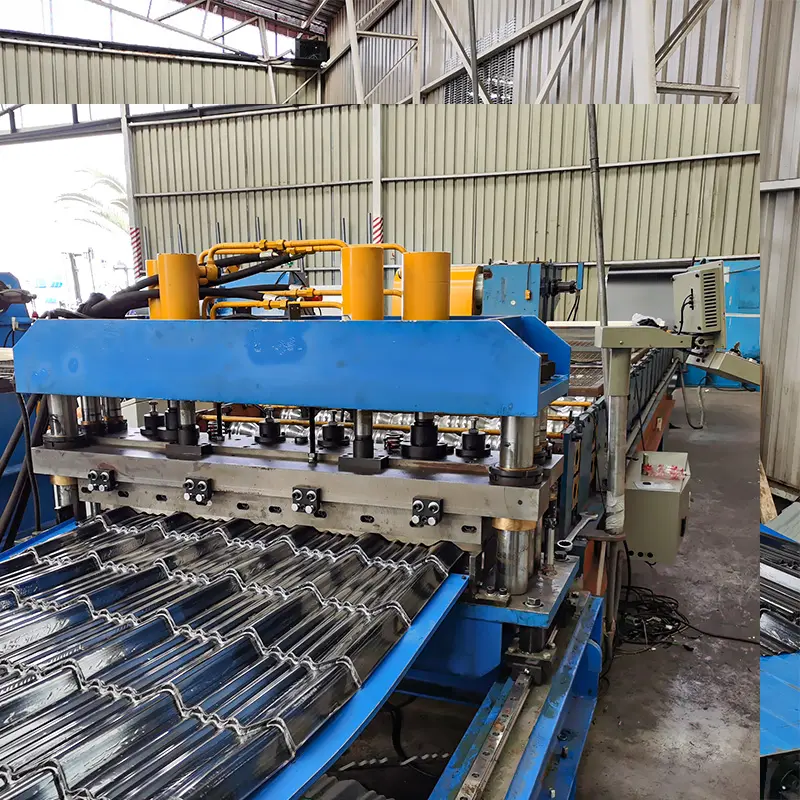
ड्राईवॉल स्टड रोल फॉर्मिंग मशीन का संचालन कैसे करें?
ड्राईवॉल स्टड रोल फॉर्मिंग मशीन का संचालन उचित प्रशिक्षण और सुरक्षा दिशानिर्देशों का पालन करने की आवश्यकता रखता है। यहाँ इसका बुनियादी संचालन गाइड है:
- 机器设置: सुनिश्चित करें कि मशीन सही ढंग से स्थापित हो और वांछित स्टड प्रोफाइल के अनुसार रोलर्स संरेखित हों।
- सामग्री लोडिंग: धातु कॉइल को मशीन में लोड करें और सुचारू फीडिंग के लिए इसे ठीक से सुरक्षित करें।
- मशीन चालू करें: मशीन को चालू करें और रोलर्स को सक्रिय करके रोल फॉर्मिंग प्रक्रिया शुरू करें।
- प्रक्रिया की निगरानी करें: फॉर्मिंग प्रक्रिया पर नज़र रखें ताकि किसी भी अनियमितता या खराबी का पता लगाया जा सके।
- कटिंग और स्टैकिंग: जैसे ही स्टड आवश्यक लंबाई तक पहुँचता है, मशीन इसे स्वचालित रूप से काट लेगी और तैयार स्टड्स को स्टैक कर देगी।
सुरक्षा उपाय और सर्वोत्तम अभ्यास
ड्राईवॉल स्टड रोल फॉर्मिंग मशीन का संचालन संभावित जोखिमों को शामिल करता है। सुरक्षित कार्य वातावरण सुनिश्चित करने के लिए इन सुरक्षा उपायों को लागू करें:
Training and Certification
केवल प्रशिक्षित और प्रमाणित ऑपरेटरों को मशीन संभालने दें ताकि दुर्घटनाओं को रोका जा सके और उचित संचालन सुनिश्चित हो।
Safety Gear and Equipment
Operators must wear appropriate safety gear, including helmets, gloves, and safety glasses.
Machine Maintenance and Inspection
Regularly inspect the machine for wear and tear, and perform maintenance as required to prevent unexpected breakdowns.
Emergency Protocols
Establish clear emergency procedures and ensure all operators are familiar with them to manage critical situations effectively.
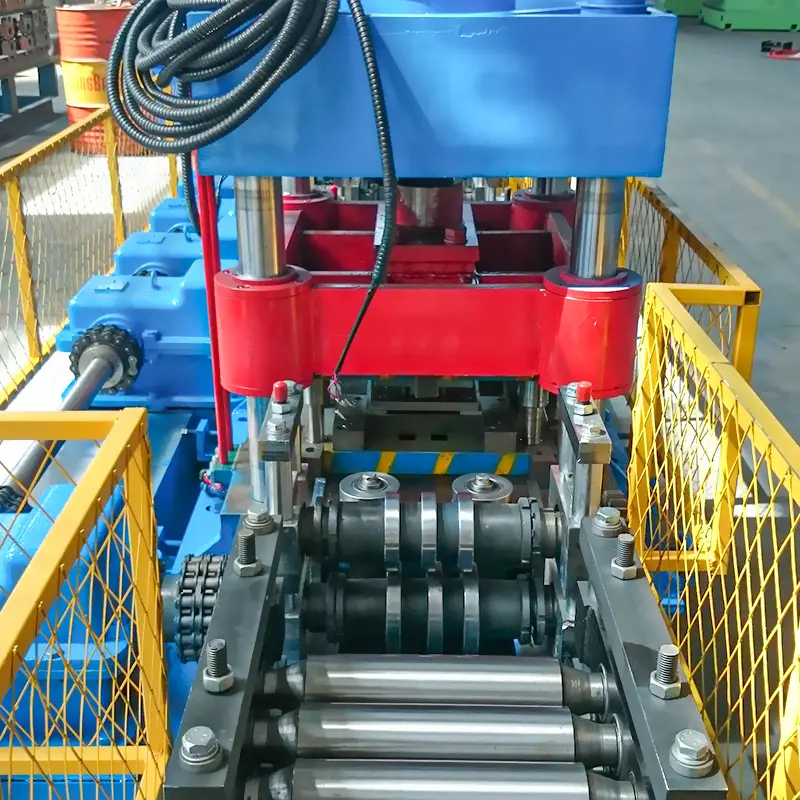
रखरखाव और समस्या निवारण सुझाव
To ensure smooth operation of the machine, follow these maintenance and troubleshooting tips:
Regular Maintenance Checks
Conduct routine inspections of the machine's components, lubricate as needed, and promptly replace worn parts.
सामान्य समस्याएं और समाधान
Stay informed about common issues that may occur during the operation of a drywall stud roll forming machine and their solutions:
- असमान फॉर्मिंगIf the studs emerge with uneven shapes, inspect for misalignment in the rollers. Adjust and realign them as necessary to maintain a uniform profile.
- सामग्री जाम होनाIf the metal strip jams in the machine, stop operations immediately and clear the obstruction carefully. Regularly check the feeding system to avoid jams.
- Inconsistent LengthsIf the studs are not cut to the precise desired length, examine the cutting mechanism and adjust the blade or sensor accordingly.
- Machine VibrationsExcessive vibrations during operation can compromise quality. Inspect and balance the rollers, and verify the stability of the machine's foundation.
- Strange NoisesUnusual noises may signal a mechanical problem. Identify the source and resolve it promptly to prevent additional damage.
Upgrading Your Drywall Stud Roll Forming Machine
As technology progresses, keeping your equipment current is vital. Consider these upgrade options for your drywall stud roll forming machine:
Software Updates
Manufacturers often release software updates to enhance performance, introduce new features, or improve automation. Check for updates regularly and install them to optimize your machine's potential.
Hardware Upgrades
Certain upgrades may require replacing or adding components, such as advanced sensors or enhanced forming rollers. Consult the manufacturer or a specialist to evaluate possibilities.
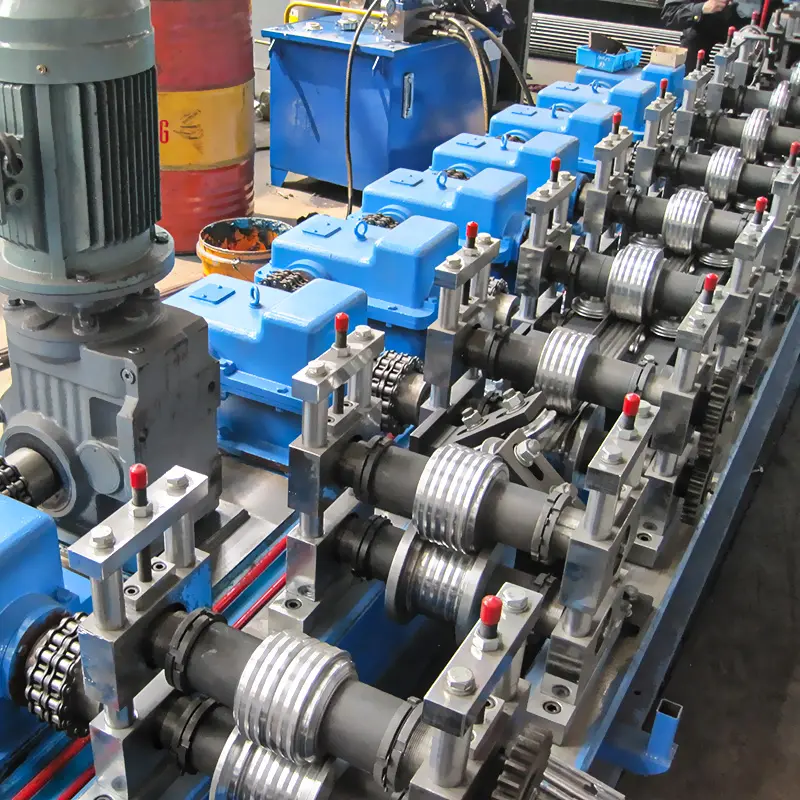
Buying a Drywall Stud Roll Forming Machine
Purchasing a drywall stud roll forming machine demands careful deliberation. Follow these guidelines for an informed choice:
New vs. Used Machines
New machines provide cutting-edge technology and warranties, while used ones offer cost savings for startups or budget-limited businesses. Thoroughly inspect any used machine's condition and performance prior to buying.
Selecting a Reputable Manufacturer
Research and select a manufacturer with a strong history of delivering reliable, high-quality roll forming machines. Review customer feedback and testimonials to assess satisfaction.
Price Comparison and Negotiation
Request quotes from several suppliers and negotiate for the best value. Factor in specifications, after-sales service, and warranty terms.
Case Studies: Real-Life Applications
Real-world case studies illustrate the benefits of drywall stud roll forming machines. Here are some examples:
- Construction of Commercial BuildingsA construction firm substantially cut time and costs by using a drywall stud roll forming machine to produce superior studs for numerous projects.
- Residential RenovationA contractor boosted productivity and accuracy in a home renovation by deploying a multi-profile roll forming machine to fabricate various stud sizes on-site.
- इंफ्रास्ट्रक्चर परियोजनाएँLarge-scale infrastructure projects, like schools and hospitals, gained from the efficiency and uniformity of drywall studs made by fully automatic roll forming machines.
Future Trends in Drywall Stud Roll Forming Machines
With ongoing technological advancements, drywall stud roll forming machines are poised for further enhancements:
- उन्नत स्वचालन: मशीनें अधिक बुद्धिमान हो सकती हैं, जिसमें एआई-चालित स्वचालन, स्व-निदान क्षमताएं और दूरस्थ निगरानी शामिल है।
- 能效高: निर्माता संचालन लागतों को कम करने और पर्यावरणीय प्रभाव को घटाने के लिए अधिक ऊर्जा-कुशल मशीनों के विकास पर ध्यान केंद्रित कर सकते हैं।
- सामग्री नवाचार: नए सामग्रियों और कोटिंग्स का परिचय हो सकता है, जो बेहतर मजबूती, जंग प्रतिरोध और अग्नि प्रतिरोध प्रदान करेंगी।
पर्यावरणीय प्रभाव और स्थिरता
ड्राईवॉल स्टड रोल फॉर्मिंग मशीनें निर्माण उद्योग में स्थिरता में योगदान देती हैं:
- अपशिष्ट न्यूनीकरण: रोल फॉर्मिंग प्रक्रिया के दौरान सामग्री अपशिष्ट को न्यूनतम करके, ये मशीनें पर्यावरण-अनुकूल विनिर्माण को बढ़ावा देती हैं।
- पुनर्चक्रणीय सामग्रियां: कई ड्राईवॉल स्टड पुनर्चक्रणीय सामग्रियों से बने होते हैं, जो निर्माण परियोजनाओं के पर्यावरणीय प्रभाव को और कम करते हैं।
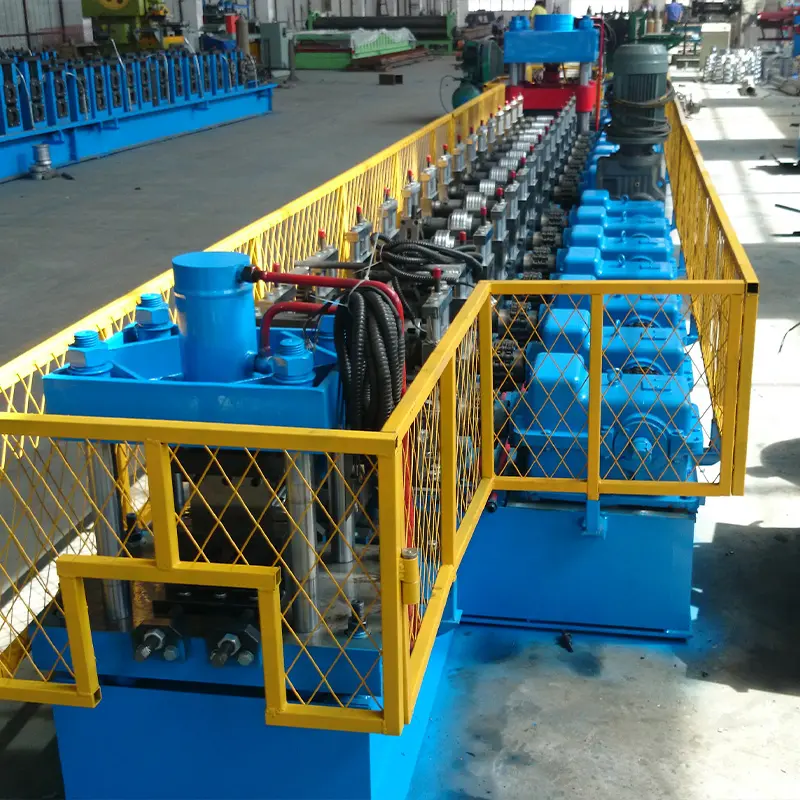
निष्कर्ष
ड्राईवॉल स्टड रोल फॉर्मिंग मशीन ने धातु स्टड निर्माण प्रक्रिया को सुव्यवस्थित करके निर्माण उद्योग में क्रांति ला दी है। उनकी दक्षता, सटीकता और बहुमुखी प्रतिभा के साथ, ये मशीनें आधुनिक निर्माण परियोजनाओं के लिए मूल्यवान संपत्ति बन गई हैं। सही मशीन चुनकर, उचित प्रशिक्षण और सुरक्षा उपाय सुनिश्चित करके, तथा प्रगतियों के साथ अद्यतन रहकर, व्यवसाय अपनी उत्पादकता को अनुकूलित कर सकते हैं और स्थायी निर्माण प्रथाओं में योगदान दे सकते हैं।
常见问题解答
Uneven Forming क्या ड्राईवॉल स्टड रोल फॉर्मिंग मशीन अन्य प्रकार के प्रोफाइल्स के लिए उपयोग की जा सकती है?
Cutting Issues हां, कुछ मशीनें विभिन्न निर्माण अनुप्रयोगों के लिए विभिन्न धातु प्रोफाइल्स बनाने के लिए अनुकूलित की जा सकती हैं।
Uneven Forming मशीन के लिए कौन सा रखरखाव अनुसूची अनुशंसित है?
Cutting Issues नियमित रखरखाव जांच की जानी चाहिए, जिसमें अंतराल मशीन के उपयोग और निर्माता की सिफारिशों द्वारा निर्धारित होते हैं।
Uneven Forming क्या ड्राईवॉल स्टड रोल फॉर्मिंग मशीनें छोटे पैमाने के व्यवसायों के लिए उपयुक्त हैं?
Cutting Issues हां, ऐसी मशीनें उपलब्ध हैं जो छोटे पैमाने के उत्पादन आवश्यकताओं को पूरा करती हैं और ऐसे व्यवसायों के लिए लागत-प्रभावी हो सकती हैं।
Uneven Forming मशीन को सुरक्षित रूप से संचालित करने के लिए कितना प्रशिक्षण आवश्यक है?
Cutting Issues उचित प्रशिक्षण और प्रमाणीकरण आवश्यक हैं, और अवधि मशीन की जटिलता पर निर्भर हो सकती है।
Uneven Forming क्या मैं मौजूदा मशीन को नवीनतम प्रौद्योगिकी से अपग्रेड कर सकता हूं?
Cutting Issues मशीन के डिजाइन और संगतता पर निर्भर करते हुए, कुछ अपग्रेड संभव हो सकते हैं। अपग्रेड विकल्पों का पता लगाने के लिए निर्माता या विशेषज्ञ से परामर्श करें।
Additional Frequently Asked Questions (FAQ)
1) What tolerances can a modern Drywall Stud Roll Forming Machine maintain at speed?
With encoder-based length control and servo flying cutoff, expect length ±0.5–1.0 mm and hole-to-edge ±0.3–0.6 mm at 40–80 m/min, assuming quality coil and proper guiding.
2) Which materials and thicknesses are typical for drywall studs and tracks?
Most lines run galvanized steel coils to ASTM A653 or EN 10346 in 0.4–1.2 mm thickness (commonly 0.5–0.8 mm for interior partitions) with G40–G60/Z140–Z275 coatings.
3) How do auto changeover features impact short-run production?
Recipe-driven width/height adjustments and servo roll-gap setting can cut changeover from 20–30 minutes to 3–8 minutes, boosting OEE for high-mix stud/track SKUs.
4) What are key acceptance tests before shipment (FAT) for a stud roll former?
- Demonstrate speed at stated gauge and profile
- Verify cut length tolerance on 50+ consecutive parts
- Show punching alignment for service holes/knockouts
- Validate safety circuits (E-stops, interlocks) and CE/OSHA conformity
- Confirm data connectivity (OPC UA/MQTT) and documentation
5) How can I reduce oil stains on pre-painted coils when roll forming studs?
Use food-grade, low-residue lubricants with micro-spray systems, maintain roll cleanliness, and add air knives or wipers; verify paint compatibility with supplier TDS.
2025 Industry Trends for Drywall Stud Roll Forming Machines
- Shorter changeovers: Auto size-changeable stud/track systems with stored recipes become standard for contractors serving multi-SKU builds.
- Higher speeds with better QA: Inline vision for knockout/slot verification and straightness/camber monitoring reduces rework and callbacks.
- Energy efficiency: Regenerative drives and smart hydraulics cut energy intensity by 10–20% vs. 2023 baselines.
- Connectivity and traceability: OPC UA-ready PLCs enable OEE dashboards, coil traceability, and predictive maintenance via vibration/thermal sensors.
- Lightweight yet robust: Wider adoption of higher-yield steels (e.g., 350–550 MPa) allows thinner gauges while maintaining performance, reducing material use 8–12%.
- Safety by design: SIL-rated safety PLCs, interlocked guarding, and remote diagnostics increasingly specified by multinational builders.
2024–2025 Benchmarks and Buying Indicators
| KPI | 2024 Typical | 2025 Best-in-Class | Why it matters | Sources |
|---|---|---|---|---|
| Line speed (0.5–0.8 mm) | 40–60 m/min | 70–100 m/min | Throughput for large projects | OEM catalogs (e.g., Bradbury, Samco), The Fabricator |
| Changeover time (stud ↔ track/size) | 20–30 min | 3–8 min | OEE on high-mix runs | OEM datasheets; integrator case notes |
| Length tolerance (±) | 1.0–1.5 mm | 0.5–1.0 mm | Fit-up, less scrap | Inline metrology vendors |
| Hole/knockout positional (±) | 0.8–1.2 mm | 0.3–0.6 mm | Faster MEP pass-through | Case studies; AISI practice |
| Energy use (kWh/ton) | 100–140 | 85–110 | OpEx, CO2e | U.S. DOE AMO guidance |
| Installed price (USD) | $45k–$95k | $60k–$130k | Budgeting | 2025 industry quotes |
Authoritative references:
- ASTM A653 (galvanized) and A1003 (CFS studs): https://www.astm.org
- EN 10346 (continuously coated steels): https://standards.cen.eu
- AISI S220/S240 (nonstructural/structural studs): https://www.buildusingsteel.org
- U.S. DOE Advanced Manufacturing Office: https://www.energy.gov/eere/amo
- OPC Foundation (OPC UA): https://opcfoundation.org
- The Fabricator (roll forming insights): https://www.thefabricator.com
Latest Research Cases
Case Study 1: Auto Changeover Stud/Track Line Boosts OEE (2025)
Background: Regional drywall fabricator supplying mixed SKUs to multiple GC projects suffered frequent changeovers and setup scrap.
Solution: Implemented auto size-changeable Drywall Stud Roll Forming Machine with servo roll-gap, recipe library, barcode job loading, and inline vision for knockout alignment.
Results: Changeover cut from 26 to 5 minutes; OEE +16%; setup scrap −52%; labor hours per 10,000 m −11%; payback in 13 months.
Case Study 2: Energy-Optimized Drive Upgrade on Legacy Line (2024)
Background: Midwestern plant faced rising energy costs and inconsistent cut length on thin-gauge pre-painted coils.
Solution: Retrofitted regenerative VFDs, added laser length encoder and micro-spray lube system; introduced SPC on cut length and hole position.
Results: Energy intensity −14% (kWh/ton); cut length Cpk from 0.9 to 1.5; paint defects related to oil staining −60%; monthly downtime −18% via predictive alerts.
Expert Opinions
- Jennifer Kinder, Director of Product Management, Samco Machinery
Viewpoint: “For drywall stud and track, normalize vendor quotes by gauge, speed, and tolerance targets; otherwise you’re not comparing like for like.”
Company: https://www.samco-machinery.com - Phil Paxton, President, The Bradbury Group
Viewpoint: “Servo-based gap setting plus flying cutoff is the fastest ROI upgrade on high-mix stud/track lines.”
Company: https://www.bradburygroup.com - Dr. Benjamin Schafer, Professor of Civil Engineering, Johns Hopkins University
Viewpoint: “Tighter, repeatable cold-formed geometries improve connection reliability and reduce onsite rework across partition systems.”
Profile: https://engineering.jhu.edu
Practical Tools/Resources
- Standards and design
- AISI S220 (nonstructural) and S240 (structural studs): https://www.buildusingsteel.org
- ASTM A653/A1003 material standards: https://www.astm.org
- Euro norms EN 10346 for coated steels: https://standards.cen.eu
- Quality and operations
- NIST SPC resources and process capability guides: https://www.nist.gov/manufacturing
- DOE AMO motor/drive efficiency tools: https://www.energy.gov/eere/amo
- Connectivity and data
- OPC UA for machinery interoperability: https://opcfoundation.org
- Industry media/OEM discovery
- The Fabricator (best practices in roll forming): https://www.thefabricator.com
- Precision Metalforming Association directory: https://www.pma.org
- Representative OEMs: The Bradbury Group, Samco Machinery, Dallan, Formtek
Last updated: 2025-10-22
Changelog: Added 5 focused FAQs; introduced 2025 trends with benchmark table and authoritative sources; included two recent case studies; compiled expert viewpoints; provided practical tools/resources tailored to Drywall Stud Roll Forming Machine buyers and operators
Next review date & triggers: 2026-04-22 or earlier if AISI/ASTM standards update, OEM catalogs change speed/price ranges ±10%, or new case studies shift best-in-class KPIs by >10%
